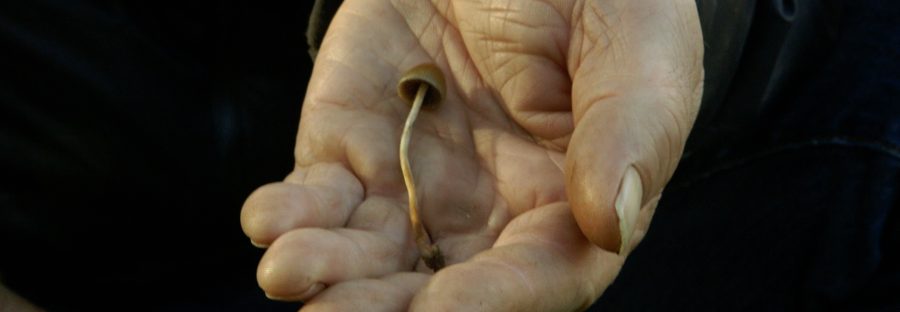Professor David Nutt: ‘magic’ medicine from mushrooms could hold key to easing pain of mental illness
- Professor David Nutt talks to NQ about the medicinal benefits of mushrooms
- Says the 'magic medicine' can help in the treatment of depression and anxiety
- Calls for rethink on drugs by government ministers
Depression is complicated. And the laws around which medicines we can have access to help combat our mental health problems even more so.
What if there was an alternative to SSRIs (selective serotonin reuptake inhibitor)? One that would give the user the potential to understand the roots of their mental illness, and thereafter their conscious ability to self-heal?
Health campaigners say there is but the problem is that it is illegal. They point to research showing “extraordinary” and “miraculous” results.
The drug is the infamous ‘liberty cap’ magic mushroom. The ‘magic’ within it is psilocybin. In its most basic form, psilocybin is a natural prodrug which causes psychedelic effects on those who consume it.
In 1968, it was banned and in 2016 the UK passed the Psychoactive Substances Act, making the production, supply, importing or exporting of a psychoactive substance illegal, and making any scientific research into psychoactive drugs a long-winded and expensive process.
David Nutt, professor of neuro-psychopharmacology at Imperial College London, chairman of DrugScience and former president of the European Brain Council, contributed to Monty Wates’ 2018 film Magic Medicine.
He was also involved in raising the money and helping to obtain a grant for the trials.

Professor Nutt said: “It took two years to get permission to run the trial, and a further eight months to set up – a three-year grant which took 32 months to start, a huge amount of wasted time.
“I think the government doesn’t want us to do this research.”
The film follows three volunteers over the course of four years who suffer with clinical depression, and their deeply moving responses to the trials.
“What we found out in our study is that everyone got a bit better. Some people got a lot better, but very few stayed well. It’s as if, once you’ve got depression it’s like a virus in the brain that can be supressed but over time it keeps forcing its way back,” said Professor Nutt.
“The depressive thoughts that you’re worthless and a failure, those thoughts are real. They’re memories. What we need is the ability not to access them. I think what psychedelics can do is take away the bit of the brain that makes you remember them, and also give you the chance to think about good things, and the ability to solve problems like why you were depressed in the first place.”
In the documentary, one of the volunteers says he was suffering from depression because he felt “invalid in his workplace”. The trial enabled him to access a repressed memory of his childhood relationship with his parents.
This psilocybin-induced epiphany allowed him to understand the roots of his depression and gave him the ability to deal with it. After the trials, he described the experience as “both happiest the most terrified I’ve been in my life”.
Psychologist Ros Watts, who sat in on the trials, said: “The trip is like going on a journey, finding that nugget of pain and integrating it into your life.”
In 2017, the UK charity MIND reported that approximately “1 in 4 people in the UK will experience a mental health problem each year, and that in England, 1 in 6 people report experiencing a common mental health problem (such as anxiety and depression) in any given week”.
What is making these statistics so high?
Professor Nutt said: “Fragmentation of families, destruction of communities, uncertainty. When I was a kid, you were going to get a job, you were going to have a house, you may not ever be rich, but you were going to be secure.
“It’s a much harsher more horrible environment than it was 20 years ago. I think people just don’t have a sense of security. We are finding that the rates of depression are getting higher – because there is no structure to society anymore.”
What were the downsides from the trials?
“That it works. It wears off and then you can’t take more (because it’s illegal),” he said.
In the UK ‘magic mushrooms’ are a Class A or Schedule 1 drug. With more public awareness psilocybin’s positive potential, is it possible that research will encourage the illegal sales of psychedelics as self-treatment or recreational use?
Professor Nutt stated: “Possibly, more people might understand them. To be honest there are an awful lot of people using mushrooms.
“One million young people a year, for the past 20 years, so I don’t think there’s going to be a sudden splurge in the sales or consumption.
“It doesn’t really worry me because I don’t think that they are harmful to be frankly honest.”
According to the 2017 Global Drugs Survey: “12,000 people who reported taking psilocybin hallucinogenic mushrooms in 2016, just 0.2% of them said they needed emergency medical treatment – a rate at least five times lower than MDMA, LSD and cocaine.”’
NQ asked Professor Nutt about his latest research and what he is most excited about?
“Your generation! We must have a discourse and a proper discussion. To hold politicians and newspaper editors to account. We need to take drug control out of the Home Office, which is all about law and order,” he said.
“Drugs need to belong to the department of health. As soon as they are, I think policies will change dramatically. In my research group we are repeating the study, but now giving two doses of psilocybin, to get longer lasting effects, and comparing it with the gold standard SSRI escitalopram.
“I think they’ll turn out to be similarly effective over the course of eight weeks, but psilocybin will work faster.”


